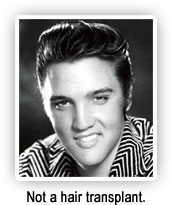hello Dr.
I wanted to ask a question about regrowing hair on the crown and propecia, and I appreciate your time very much.
I am a male, 34, and have been thinning for about 12-14 years, pretty diffuse. I have slowed the loss substiantially with nutrition and minoxodil, but my hair grows slower than it used to for some reason… I have recently begun adding copper peptides once in the evening along with minox 5% 2X per day.
I only have noticable loss on the top/ crown, but think I lost most of that 5-10 years ago. My hesitation to take propecia is due to cost, side effects, long term health effects, and the fear or worsening the hairline, which I have read on blogs sometimes occurs, but am considering taking it or maybe .5 mg per day to see about helping the crown regrow.
my question for you is, what help can propecia be under the best circumstances for hair lost many years ago?? I have heard that it cannot help beyond 2 years back, but have also read that it sometimes helps bring people back to a state from many years back. Thoughts?
thank you kindly.

Propecia will not benefit you if you have a slick bald area, but hair elsewhere in the thinning process may be helped. If you have not completed your balding pattern, Propecia may have value. I would have to examine you to know what benefits you may have, as the information you supplied is not adequate for me to base recommendations upon. You could take 1/2 a dose, but the recommended dosage is 1mg. Some people do cut the 5mg generic finasteride pill for a substantial cost savings, as long as you have a doctor that will prescribe the 5mg to you (it is a prostate drug).

 The break-up and your hair loss could be related, as stress-related hair loss can occur from emotional causes. Or it could be coincidence, with this being the start of genetic hair loss.
The break-up and your hair loss could be related, as stress-related hair loss can occur from emotional causes. Or it could be coincidence, with this being the start of genetic hair loss.
 I am assuming that you plan on ingesting the urine, as opposed to applying it on your scalp. I don’t think drinking it would be a negative on your hair (nor would applying it to the scalp — though I don’t know why you’d do that), but I have to admit that I don’t know a lot about urine therapy. Anyone with more experience in this area would be welcome to add a comment.
I am assuming that you plan on ingesting the urine, as opposed to applying it on your scalp. I don’t think drinking it would be a negative on your hair (nor would applying it to the scalp — though I don’t know why you’d do that), but I have to admit that I don’t know a lot about urine therapy. Anyone with more experience in this area would be welcome to add a comment. Mount Vernon’s Junior High School pool shuts down after it tested positive for high amounts of chlorine.
Mount Vernon’s Junior High School pool shuts down after it tested positive for high amounts of chlorine. What do you think it is? Is it fixable? Will my hair grow back? Should I do something different? Should I use certain hair products? HELP!!!!!!!!!!!!!
What do you think it is? Is it fixable? Will my hair grow back? Should I do something different? Should I use certain hair products? HELP!!!!!!!!!!!!!